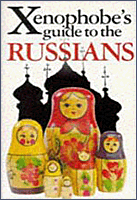






Contents:
 |
|||||
The Russians love to sit down for a nice long chat. Infrequently, but from time to time in their history, this has taken the form of a "parliament". Russian debates go on not just for years but for hundreds of years. They are still arguing about whether they should have anything to do with Western European culture and all the contamination of pure Russian hearts and souls that this entails.
Russians prize the quality of "soul" (dusha) above all others. Providing someone or something has dusha, he, she or it is home and dry. Yeltsin has masses of dusha, Gorbachev had virtually none. People with dusha tend to drink too much, cry, fall in love, and fall into rivers off bridges on their way home from a night out with the boys. In Russian eyes this is a reassuring feature.
They have a tendency to "open their soul" to complete strangers, telling everything about themselves even if the other person doesn't particularly want to know. The Russians are long-suffering but not exactly placid. They have a saying: "It takes us a long time to saddle up, but once we are we up, we go like stink". What they admire is a spontaneous gesture - such as a young woman standing up in a restaurant to serenade a poet she recognises at a neighbouring table. They are generous to a fault. As you accept a share of their last crust of bread, an unworthy thought may cross your non-Russian mind: "Will he expect me to do the same for him one day?"
The Russians are extremely ingenious with bits of recalcitrant machinery. One distinguished old soldier who fought with both the US and the Red Army during World War II commented that of the two he felt safer with the Russians because when something broke it was mended there and then with whatever came to hand on the battlefield. There was no question of packing it in and going home until a spare part arrived from Seattle. Yes, the tanks were sometimes cobbled together with bits of string, and the planes flew on one engine. This quality is called in Russian "nakhodchivosf" - the knack of finding solutions. In Russian folk stories and fairy tales the hero Ivan Durachok triumphs because of his foolishness and simplicity. He is always asleep under a haystack when disaster befalls his cleverer and more ambitious brothers.
Russians are accomplished and habitual liars. This is something that has to be taken into account in business dealings and in affairs of the heart. They conceal the truth because they feel that it might be impolite to show the shabby reality. Thus for many years, gullible Western believers in the socialist paradise were led by the nose to view examples of "Russian hospitals" (i.e. the one well-equipped hospital in the whole country used only by the Politburo), "Russian schools" (the same story), "Russian workers' flats" and so forth.
The habit of concealing the modest, not to say shameful, truth behind a bit of stage scenery was started by Catherine The Great's favourite general, Potemkin, who once lined the route of one of her royal progresses with Villages' which were, in reality, mere painted facades.
2009 ╘ All rights reserved. Designed by TatkaCo: tania@email.it
